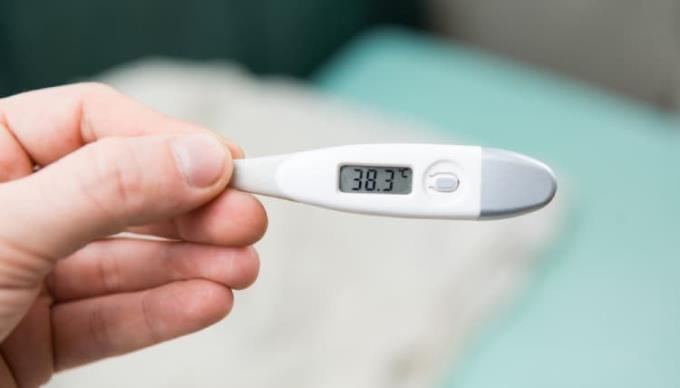During pregnancy, many pregnant mothers sometimes suddenly feel chills suddenly while the ambient temperature is completely normal. So is this pregnancy chills a sign of something unusual?
In fact, there are many reasons why you may feel chills during pregnancy. This is also considered a very normal response of the body. However, this situation also makes pregnant mothers feel uncomfortable not to sleep deeply or even makes the body more tired and depleted.
Therefore, by having a better understanding of what is causing these changes in temperature, you can feel more secure.
The article below, aFamilyToday Health will help you find the source of this condition, and give you good tips for chills during pregnancy that will not bother you. Please refer to it now!
What is the chills during pregnancy?
When there is a chills, the pregnant mother will feel the parts of her body are cold, her limbs are weak while herself is still being kept moist or the outside temperature remains at a normal level.
This usually occurs in the first trimester due to hormonal changes in the body. Many people also find that chills also have many similarities with the phenomenon of morning sickness. This is symptoms of pregnancy that appear and last for the first three months, then gradually decrease and disappear over the next few months.
The chills during pregnancy also make pregnant mothers tired, weaker body, poor appetite and lack of sleep.
The possible reasons for chills during pregnancy you need to know
You may have heard that changes in body temperature are part of pregnancy. But the truth is that pregnant women often feel warmer due to strong metabolism, and elevated hormone levels cause temperature fluctuations.
However, this also doesn't mean that chills are unusual. Certain reasons can happen that can make pregnant women feel cold. The causes include:
1. Chills due to anemia
State of anemia occurs when red blood iron levels and the body's levels are too low. Iron is a mineral that plays a role in creating blood cells and carrying oxygen to other organs.
Not only pregnant women, adolescents and infants are also susceptible to anemia. Chills are one of the early symptoms of this condition. Followed by symptoms such as pale skin, shortness of breath, chest pain, irregular heartbeat ...
2. Morning Sickness

Chills during pregnancy can also stem from morning sickness . This is also one of the reasons why pregnant women feel cold all the time.
In addition, the nutritional factor also plays a very important role. Without consuming enough food, the body does not have food to convert it into energy. This causes your body to "struggle" more to stay warm.
3. Infections
It is possible that even the simplest infection can give you chills during pregnancy. Some common infections in pregnant mothers can be mentioned as:
Urinary tract infection (UTI): The incidence of this disease falls to about 10% in pregnant women. This is when bacteria enter the urinary system, including the urethra, bladder, ureter, and kidneys. If detected and treated with antibiotics early, it will heal quickly.
Upper respiratory tract infections: The upper respiratory tract consists of the sinuses, nose, throat, and larynx. When having this condition, pregnant mothers will have symptoms such as runny nose, sore throat, cough.
Amniocentesis: If the mother is pregnant with signs such as high fever during pregnancy, sweating a lot, fast heart, vaginal secretions, uterine contractions ..., the pregnant mother is at risk of infection amniotic fluid.
Digestive system virus infection: Pregnant women infected with the digestive system virus are prone to diarrhea and vomiting. If not treated and promptly rehydrated, it will lead to many serious consequences.
4. High body temperature

At the start of pregnancy, your body temperature will stay high for several weeks. This high temperature can cause you to react to the surrounding air because your body will be fooled into thinking that its temperature is lower than its environment.
This body change can cause pregnant women to experience chills for a considerable period of time. The chills you will experience are similar to those you experience having a cold.
How to deal with chills during pregnancy?

If your pregnancy chills are a normal physiological cause, you can try:
Wear a lot of clothes: Keep warm, wear 100% cotton underwear and do not stand in the windhead or right in the air flow.
Rest and relaxation: Make sure you get enough sleep, not fall into a state of stress.
Adequate iron supplement: Iron minerals have a pronounced anti-cold effect but most people do not meet basic needs. Pregnant mothers can eat meats such as goat, beef, egg yolks and can take iron supplements as prescribed by your doctor.
Do light exercise: You should walk, practice yoga, massage your hands and feet after you feel cold to increase your body temperature. Heating devices like electric blankets can be used if you experience chills during nighttime pregnancy.
Keep track of what you eat: Inadequate nutrition affects your body temperature. Pregnant mothers should add more fresh fruits, eat nuts and seeds.
Eat more foods high in vitamin A: Because this nutrient enhances cold tolerance.
It is advisable to limit foods high in iodine: The body absorbing too much amniotic fluid will reduce the function of the gland, which is also the cause of chills.
Chills or chills during pregnancy are common. However, if the chills are due to medical conditions, pregnant mothers should visit a doctor for the most accurate diagnosis and treatment!














